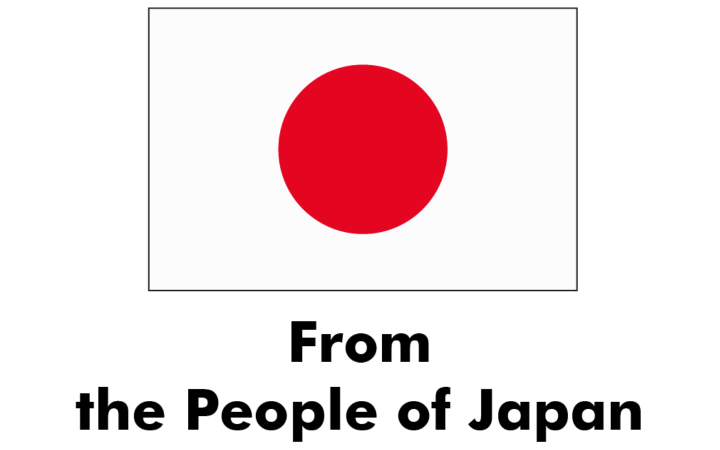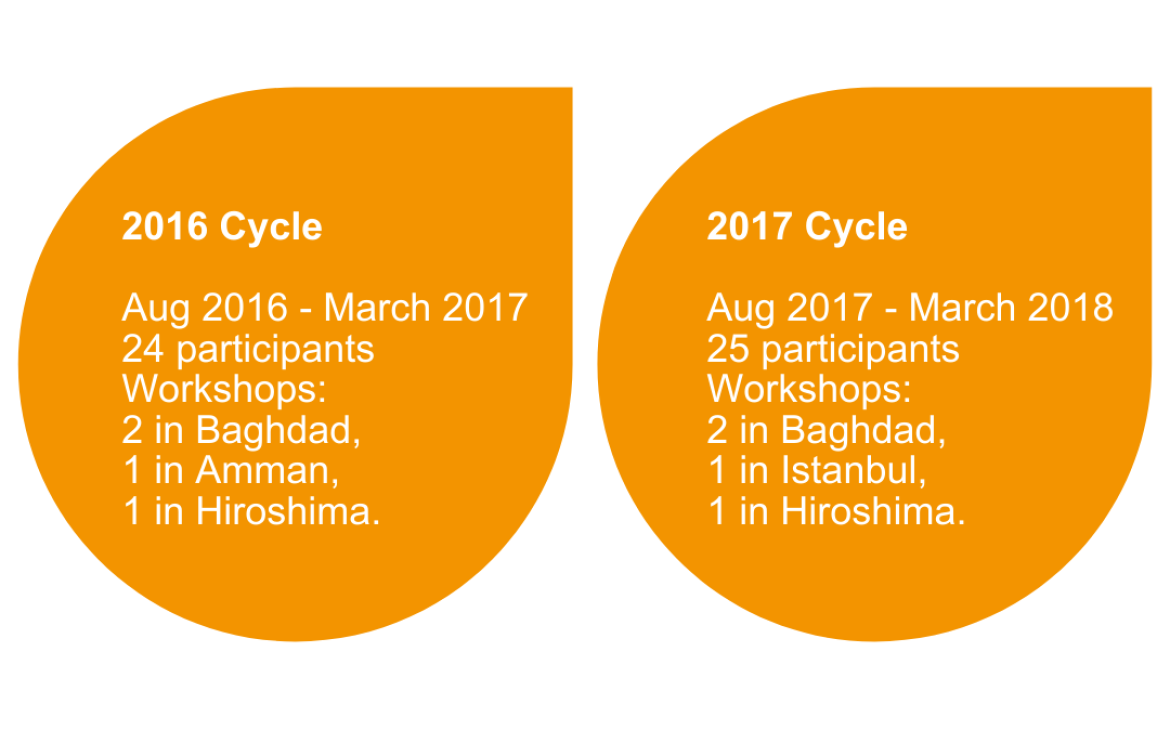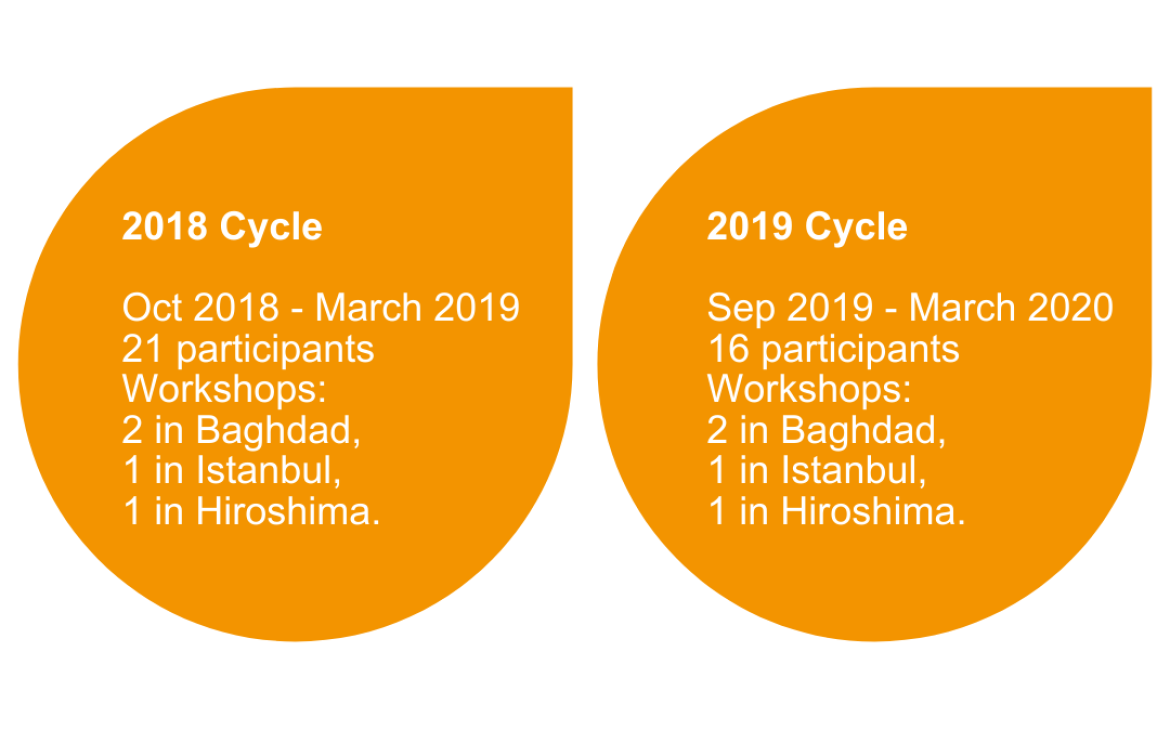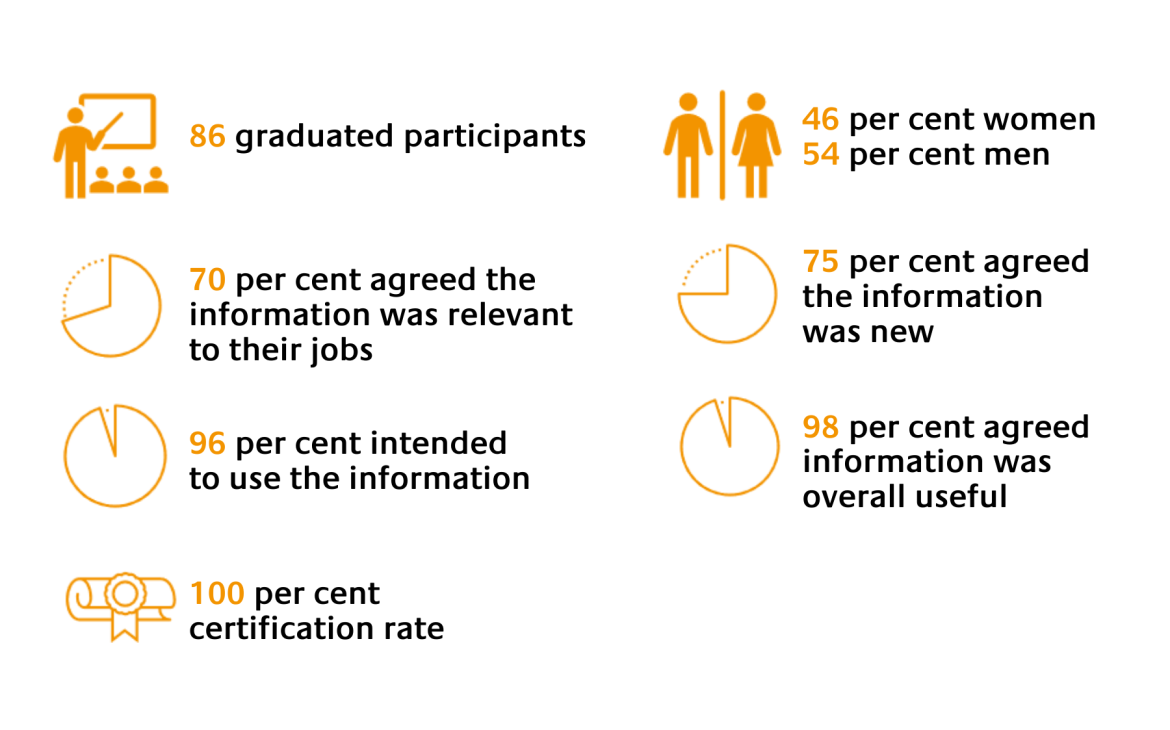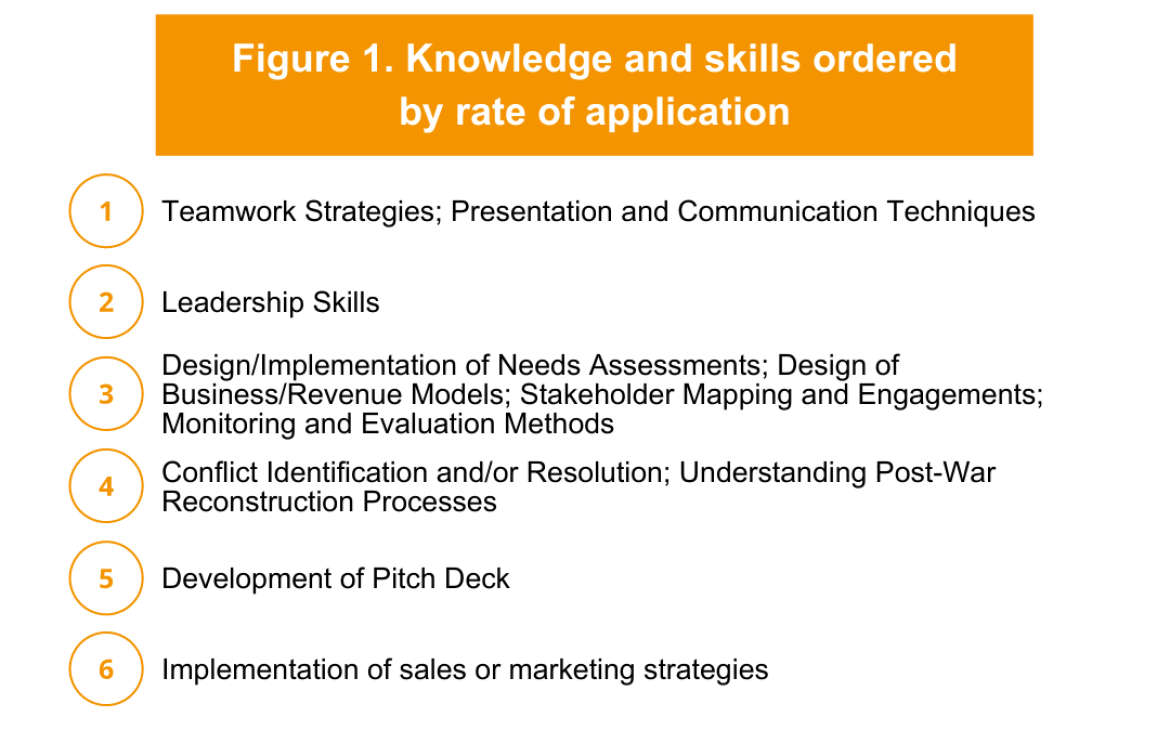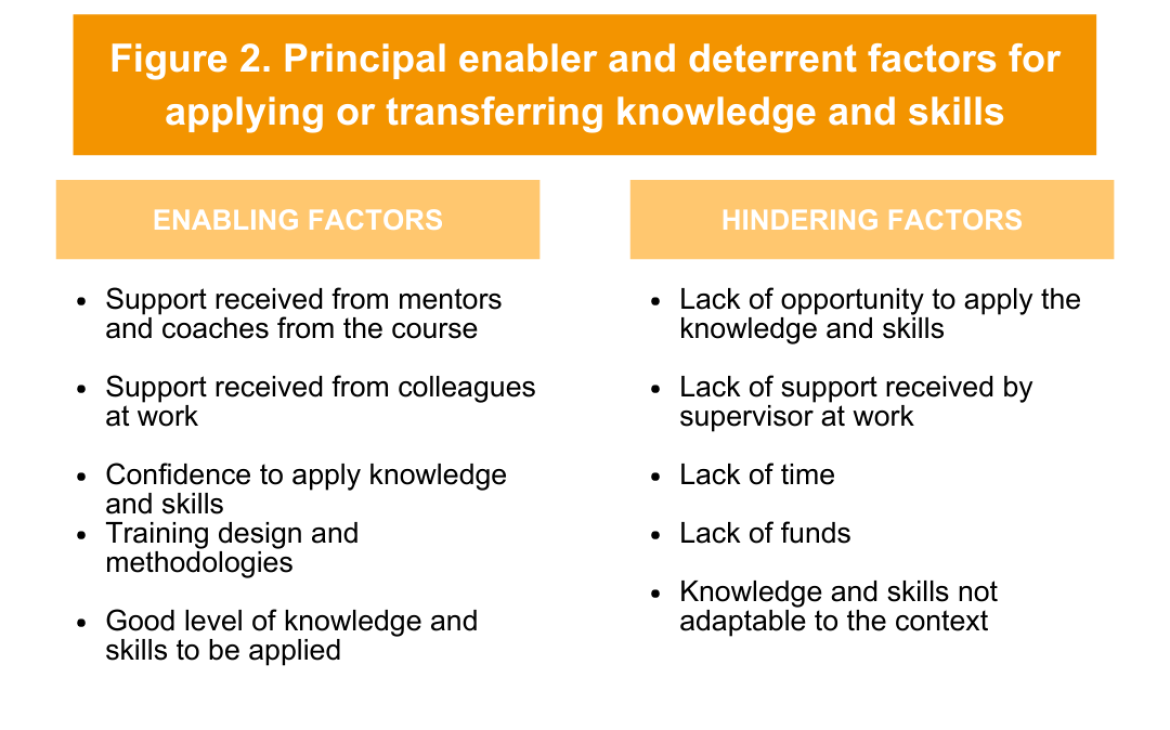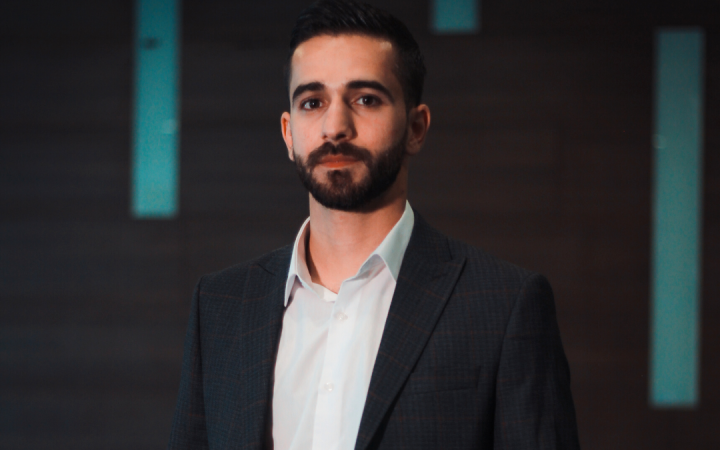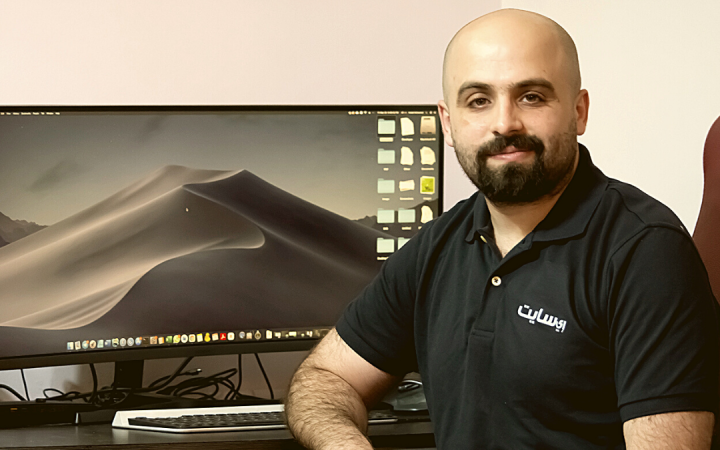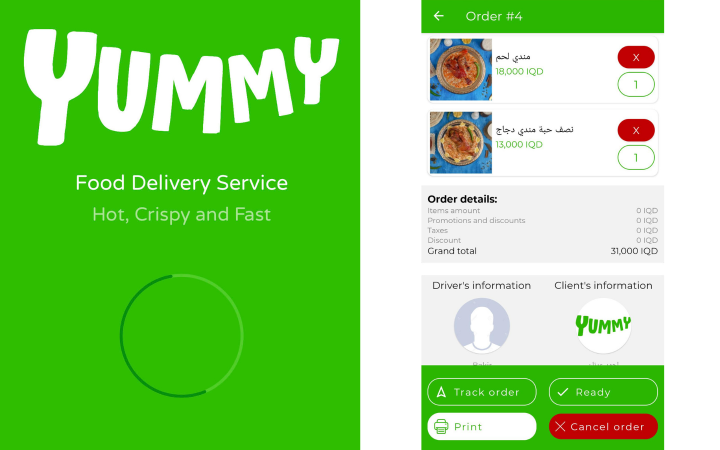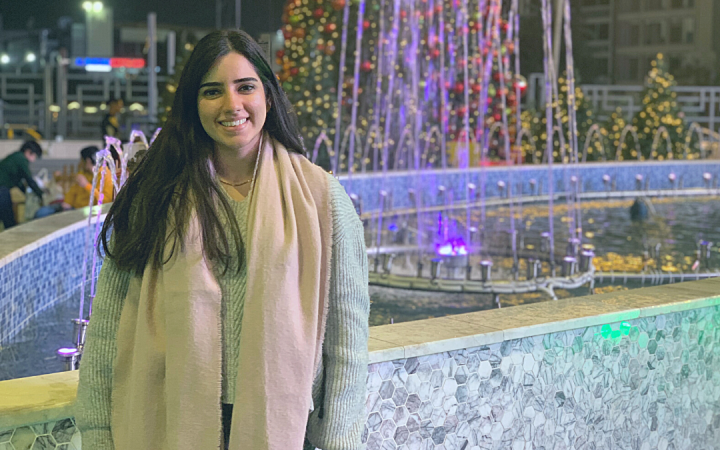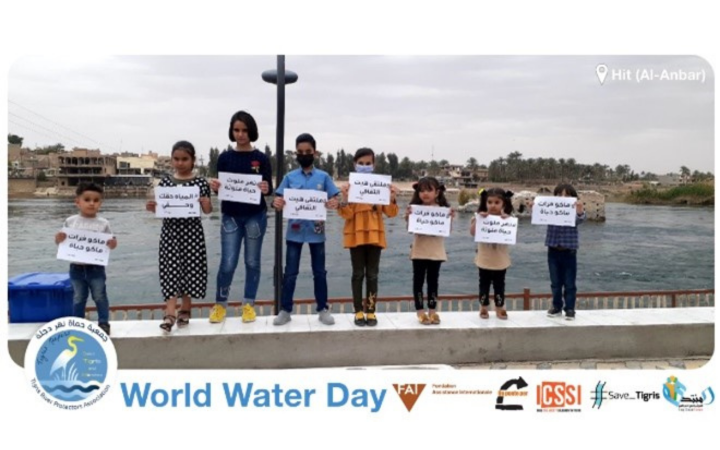Background
The UNITAR Iraq Entrepreneurship and Leadership Youth Training Programme is a fellowship initiative that provides youth with skills in entrepreneurship and leadership to develop or strengthen local businesses that contribute to social and economic stability in their country. The programme objective is to equip the youth with hard skills to enhance project and business development and implementation (i.e., business planning, business and revenue models, needs assessment, sales, marketing and innovation strategies, and monitoring and evaluation techniques), and soft skills to promote effective management of the businesses (i.e., teamwork strategies, communication and presentation techniques, leadership skills, conflict identification and resolution).
Targeting young professionals working in areas or institutions relevant to entrepreneurship, project implementation and leadership, the programme takes place yearly over approximately six months, consists of two international and two national work workshops. Between workshops, the participants complete practical assignments and develop an individual business project with the support of international and regional mentors and local coaches. Since the 2017 cycle, the programme introduced local coaches, who are former participant volunteers, to support and mentor the fellows.
From 2016 to 2019, 86 participants took part in the programme, 46 per cent of them female (37). According to past evaluations from the programme, 75 per cent of the participant respondents agreed that the information provided was new to them and 96 per cent had intentions to use it in their workplace. Moreover, 98 per cent found the programme contents useful and 80 per cent were overall satisfied with the workshops.
In this Impact Story, we review the extent to which participants have applied or transferred knowledge and skills from the programme and the challenges encountered by them and spotlight the experiences from three participants. We conducted a survey with participants from the 2016-2019 cycles (24 per cent response rate and 14 per cent complete responses) and organized three follow-up interviews to deepen into potential changes. The results presented are based on the survey responses and interviewees only.
Application of knowledge/skills and individual project implementation
Almost all of the survey respondents had previous experience working in entrepreneurship and leadership issues or knowledge before the programme. Seventy-six per cent had already received training related to leadership, entrepreneurship or project/business implementation. Most of them work in the private sector (usually as entrepreneurs) or are implementing projects in NGOs, governmental organizations and universities. Eighty-three per cent of respondents considered the skills from the training to be very or fully important for their job success. The selection and profile of the participants possibly led to a high application rate of skills from the training with one hundred per cent of respondents confirming application of knowledge and skills, which is well above the average UNITAR rate of 80-82 per cent.
The survey found that soft skills had a higher application rate than hard skills (see Figure 1). Communication and presentation techniques, leadership skills, and teamwork strategies were the three most applied skills from the programme. On the other hand, implementing sales or marketing strategies and elaboration of Pitch Deck (corporate strategy presentation) were the least applied to respondents’ work activities.
The lower application of hard skills might be associated with conditions and opportunities at the workplace and not necessarily a lack of knowledge acquisition from participants. The factors suggested as hindering the application of knowledge (Figure 2) were related to structures and opportunities at work (e.g., lack of support from their supervisor at work, lack of funds, lack of opportunities). All these factors are needed to apply many of the technical skills, such as implementation of marketing strategies, whereas some of the soft skills may not need many monetary resources but could depend more on individual confidence to transfer the knowledge. Also, most of the participants were early-stage entrepreneurs and then it was more difficult for them to put into practice the learning from the programme.
The high application rate may also be linked to the design and implementation of individual projects developed during the fellowship. Most survey respondents reported that their projects were either implemented or that they were continuing to work on them. For those who have not yet implemented the project, the main challenges are lack of funding or seed capital, lack of networks to connect with potential investors, improved knowledge to continue the project and security situation in the country.
An additional application driver from the programme is the coaching experience. Although only a small proportion of the fellows have the opportunity to participate as a coach in future editions, the experience seems to generate positive reactions in securing knowledge, gaining additional skills, and expanding their networks as they can connect with other entrepreneurs in the country.
Being a coach give me a new perspective to the learning process, give me more resources and an opportunity to meet new entrepreneurs in Iraq.
Gaining more knowledge about entrepreneurship and have the opportunity to look at variety of ideas and projects.
I learned a lot from being coach and it added more knowledge to my experience where I used to be trainer with other company.
Coaching always mean leaning for me as well. One of the challenges was coaching online and not receiving enough coaching practice before starting.
IMPACT STORY - Akram Qadir Rashid
Akram Qadir Rashid
Co-founder of Paragon and Collaborator at Haw Organization
Transferring leadership skills to youth
Sulaymaniyah, Kurdistan, Iraq – 2018 Cycle. Akram is a medical laboratory graduate but has dedicated his professional life to the humanitarian, leadership and entrepreneurship sector for around eight years. He is very passionate about learning and, above all, about transferring knowledge and aptitudes to others, especially to youth. Akram is currently working as a volunteer at the Haw Organization, co-leading a project that provides training to youth, and has continued working on his business project developed during the fellowship programme.
At the time of the fellowship programme, Akram was working in an NGO that provides services and builds capacities in the areas of entrepreneurship, emergency relief, microfinance, youth, women and protection in the Kurdistan region. He decided to apply to the fellowship programme to acquire more knowledge and information about entrepreneurship and leadership from an organization that specializes in capacity building. Moreover, the programme offered some of the fellows the opportunity to act as coaches for the subsequent cycles, and Akram felt motivated about this potential opportunity.
Akram described the fellowship programme as an impactful learning experience with many talented co-fellows. When he completed the training in 2019, he wanted to share with other people the knowledge obtained from the programme and, together with some friends, decided to create Paragon, a volunteer-based organization that aims to develop youth leadership and strengthen educational development. Since 2019 they have delivered free face-to-face and online courses in multiple areas, including business development and entrepreneurship, leadership and public speaking, where Akram put into practice what he learned from the fellowship programme. Since 2019, they have delivered training to approximately 148 young people and plan to partner with larger organizations. An example of this is the “Haw Academy” project, in partnership with Haw Organization (1), which aims to provide leadership and vocational learning courses.
Akram is very passionate about teaching. Besides his work at Paragon and the Haw Organization, he transfers the entrepreneurship skills acquired from the programme when he has the opportunity. He told us that recently he supported a friend working with traditional Kurdish food in developing her business ideas, community management and how to approach her clients.
The fellowship programme also helped Akram to work in and improve his confidence. He always has been very motivated but sometimes he had not enough confidence to do new things. He believes that being more confident has helped him to do the job he is doing now, including continuing to work on his business proposal from the fellowship programme.
Akram’s project is creating a digital platform that connects real estate agents and the governmental associations in charge of real estate processes. When working with his brother in real estate, Akram had observed that there are often misunderstandings between government and real estate agencies with regards to the real estate prices and hence his idea aims to increase transparency and accuracy. To gain more experience and develop networks with professionals in the field, Akram started working as an assistant for one of the lawyers from a real estate governmental organization. During this time, a challenge encountered was the lack of funding to start implementing his project, and it took him two years of hard work to mobilize investors. Fortunately, this year his proposal was accepted for funding by an investor.
Overall, Akram is very positive about his experience in the fellowship programme and has transferred what he learned to other people. He hopes that in the future the programme could incorporate a diverse pool of coaches from different regions in the country and that fellows could have more follow-up from the programme staff for the development of their individual projects.
IMPACT STORY - Areeb Mohamed
Areeb Mohamed
Co-founder and Managing Director of eSITE Information Technology
Leadership and entrepreneurship skills to improve business solutions and access to clean water
Baghdad, Iraq – 2017 Cycle. Areeb is an entrepreneur in the area of information technology. He is one of the three co-founders of eSITE, a private business specialized in software development and IT services. Aiming to improve and expand his business services, Areeb was interested in gaining knowledge in leadership and entrepreneurship skills and decided to apply for the fellowship programme. Now, Areeb feels more confident about his knowledge and performance as an entrepreneur and feels more connected with other entrepreneurs in his country.
Many of Areeb’s company clients are engaged in startup projects and led by youth. Therefore, the company not only provides IT services but also advises on business solutions. Areeb considers that the goal of the enterprise is to build projects for people. Having a better preparation on issues related to leadership and entrepreneurship improves not only the quality of the services in his company but also the quality of the projects of their clients. The fellowship programme helped him to improve his knowledge about project planning, project management and presentation and communication skills, leading to better work performance.
As an example, Areeb is currently using the business model canvas and the project planning techniques learned during the workshops in his projects. He considers this has been helpful to organize and simplify information by identifying the different inputs, outputs and activities of each project and the stakeholders who are champions in each area of concern. Besides making his work simpler, the external audiences (e.g., investors and stakeholders) can also read the projects faster and understand better the project's purpose and the target audience.
Moreover, Areeb has shared the skills from the fellowship programme with his colleagues at work, always advising them to improve the quality of their presentations, making them shorter, clearer and more convincing. The proposal writing skills from the fellowship programme have also proved to be important for Areeb and his team. They have recently gained a grant from IOM (1) to implement their project “Yummy Food Delivery”, which was the one presented by Areeb as his individual business project during the fellowship. Areeb considers that incorporating project planning and presentation skills to this project was relevant to win the grant and hence the fellowship helped winning the grant.
Yummy Food Delivery is a mobile application that provides food and water delivery services. Areeb identified an increase in the demand for food delivery services in Iraq, however, there were not enough suppliers and some cities did not have enough coverage, or there were many problems with the platforms, including delays and invalid orders. Providing services through a mobile application also aimed to simplify the process that is often done on phone by other providers. His project aims to fill these gaps and also includes a service to deliver clean water to the households in the city. Delivering clean drinkable water is a need that has not yet been addressed by any company. Obtaining safe drinking water is a challenge in Iraq, and most people need to buy bottles of purified water. Nonetheless, the people encounter difficulties transporting the water, especially those who do not own a car or truck. Therefore, their project aims to have a positive impact on the community.
The project is now in its final stage, but it has not been launched due to the restrictions to restaurants and other food suppliers imposed as sanitary measures to control the spread of the COVID-19 pandemic in Iraq. Areeb believes that they will soon be able to start delivering food and water to many Iraqi households and expand the platform to cover other related needs. He also hopes that the fellowship programme can be continued and even expanded to more than one edition per year or provide short side workshops to support the training for young leaders and entrepreneurs in the country.
Impact Story - Basma Haitham
Basma Haitham
Communications Officer at Un Ponte Per
Implementing communication skills and networking to address local challenges
Baghdad, Iraq – 2018 Cycle. Basma has several years of experience working in the area of communications, marketing and advertisement. However, she has always been interested in entrepreneurship, specifically in social entrepreneurship, and in providing solutions to local needs and challenges. She is currently working as a communications officer in an NGO focusing on civil society activism and engagement through a series of information campaigns, cultural exchange, cooperation projects, peace building programmes and the creation of social justice networks. Basma would like to focus her career working on projects that help Iraqi communities to resolve their needs.
At the time of the fellowship programme, Basma was working in an adversting company and was completing her undergraduate degree in English Literature. She was interested in gaining more knowledge about entrepreneurship, and the fellowship programme was a great opportunity. Basma says that she loves how someone can make changes throughout a small business or startup and how entrepreneurship can affect us personally and professionally. Although she has not had the opportunity to work directly in entrepreneurship, she has worked in NGOs that aim to impact communities. As a communications officer, she recently coordinated a campaign to create awareness about water conservation, addressing the challenges with safe water in the country, just like Areeb.
The communication and leadership skills gained during the course have helped Basma to perform her duties as a communications officer, especially on how she coordinates with the organization’s partners, donors or even the beneficiaries. Part of her work is to promote the organization’s activities on social media and other channels, contact partners, and identify stakeholders for funding opportunities. Hence, Basma states that she applies the knowledge from the fellowship daily when performing her work. In addition, Basma occasionally deals with project implementation and monitoring, using the knowledge from the training and transferring this knowledge to her colleagues. When newcomers join the NGO, Basma also took the lead in introducing them to their new tasks, thanks to her confidence and leadership skills.
Basma was selected to be a coach for the 2020 cycle of the fellowship programme, which she considered an invaluable experience that allowed her to directly transfer the skills gained when she was a fellow. Basma talks very passionately about her experience as a coach and seems very committed to her role. She believes she strengthened her leadership skills while being a coach. Moreover, the coaches received training before the programme took place which allowed her to learn coaching techniques.
An important element from the fellowship programme for Basma was networking. She could expand her networks with more experienced professionals in the entrepreneurship field, including her classmates from her cycle and the coaches and fellows she met when she was a coach. She also met other people with similar interests in regular meetings of alumni of the fellowship programme in Baghdad with whom she is still in contact.
In the future, Basma would like to implement her own project with a focus on empowering displaced women in the North of Iraq through entrepreneurship in the area of handicraft where she could use the knowledge gained from the course and her experience working in NGOs dedicated to activism and civil society. She also hopes that as soon as the COVID-19 restrictions are removed, future fellowship programmes will again be organized in person, as she is able to observe differences in learners' engagement from her perspective as a coach of the 2020 online fellowship edition.
Conclusion
The professional profile of the participants allowed the application of knowledge and skills from the programme to their workplace. When disaggregating by type of skills, soft skills were more common to be used at work than hard skills, although all of them have a high application rate. The above does not mean that hard skills were less useful, as interviewees and survey respondents mentioned how technical skills improved the quality of their work, but that they encountered more challenges when trying to incorporate these types of skills.
Regarding the implementation of the individual business projects, the support received from coaches and mentors in the design phase was valued very much by the participants. Nonetheless, the fellows encounter some constraints when trying to implement their projects once the fellowship ends. The main challenges include the availability of funds or seed capital and the lack of networks to connect with potential investors. Some fellows recommended having more follow-up from the programme coordinators after the training, especially for those with less experience. Still, the development of projects during the fellowship certainly contributes to the application of knowledge and skills after the training. Some participants, such as Akram, have shown an extraordinary degree of persistence which led him to implement his project.
An additional advantage of the fellowship programme is networking. Exchanging ideas and experiences with other professionals in the field allows participants to expand their networks and gain more knowledge from a practical perspective. The coaching component also brings additional opportunities to those selected for increasing their knowledge, skills and networks. In a nutshell, the structure, content and coaching support provided during the programme is well appreciated by the fellows.


